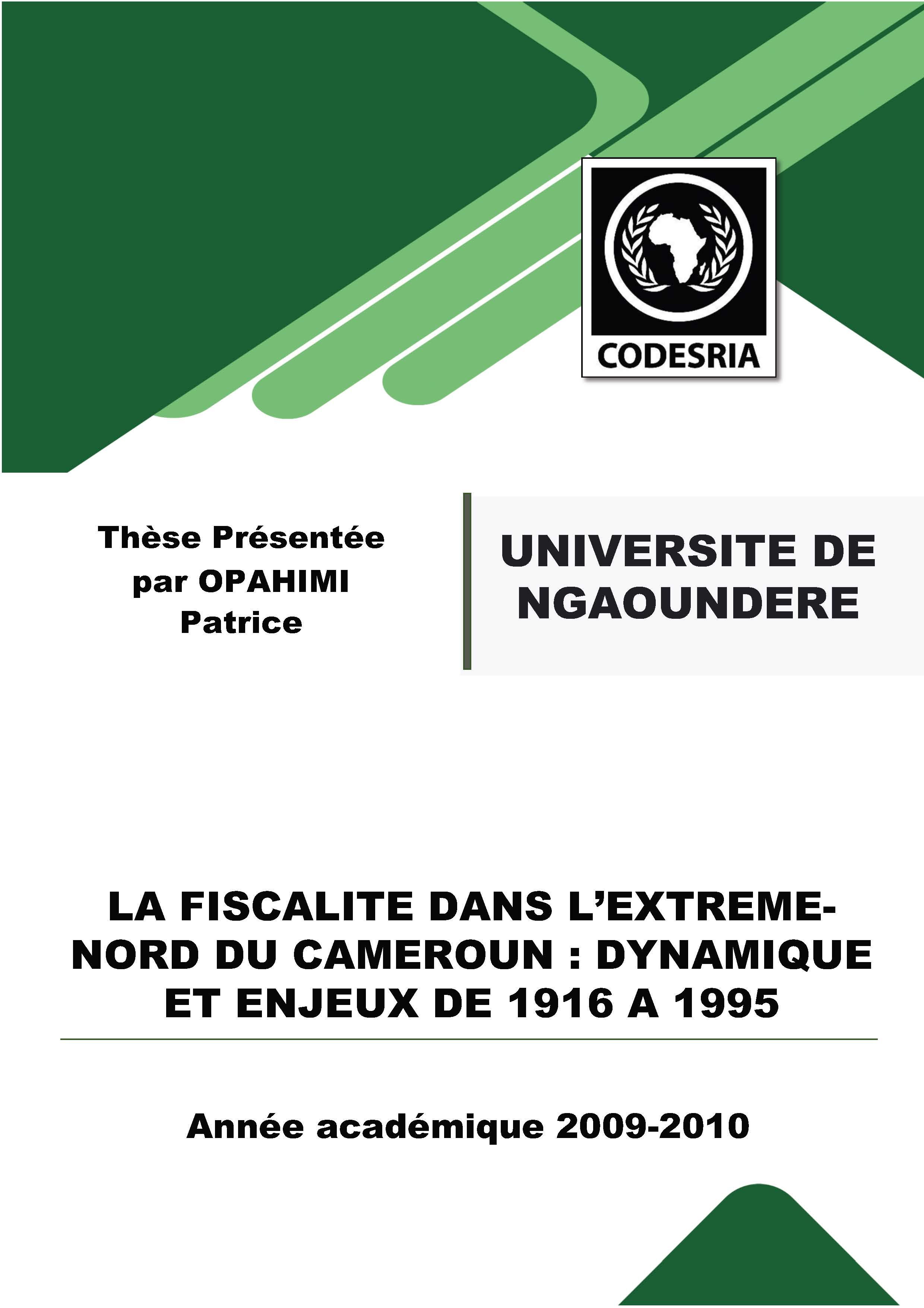LA FISCALITE DANS L’EXTREMENORD DU CAMEROUN: DYNAMIQUE ET ENJEUX DE 1916 A 1995
Keywords:
Tax, redevances, Diamaré Plain, Mount Mandara, resistanceSynopsis
This thesis looks at the stakes and dynamics of fiscal system in the Far North of Cameroon. It examines the bases of tax system and lays out the methods of collection and reactions thereto. It is obvious that, due to the multiplicity of taxes, tax system is not a new phenomenon in the hierarchical pre-colonial societies. Be it considered as an act of gratefulness to a pater familias or simply as a proof of subjection, it goes without saying that taxes have an impact on tax payers’ revenue.
During the colonial era, taxation symbolised allegiance to the colonial administration. Tax collection included pacification mechanisms, taming and tax census. In a bid to subdue the population through taxation, harsh and strict measures were employed. In the process of tax collection, the leaders and their agents wielded varied abuses on the population under pressure while the principle of tax majority trampled on. Cases of tax embezzlement were many although the administration severely reprimanded it.
With the independence of the state, the tax system did not experience a major mutation. The population often reacted variently towards the actions of the tax collectors. Fiscal delinquency, invoked by administrative authorities, explained the insubordinate
behaviour adopted by tax evaders. The 1980s economic recession and the 1990s political liberalization witnessed cases of rampant tax evasion, leading to the cancellation of contractual tax in 1995 and the introduction of the global tax. The latter faced a lot of difficulties with regards to its collection, despite the arguments of fiscal justice which underlie it. Though supposed to lean on economic activities, the global tax is conceived by many as tax exemption under the pretext of democracy.
Downloads
References
Abwa, D., 2000, Commissaires et hauts commissaires de la France au Cameroun (1916-1960), Yaoundé, PUY-UCAC.
Adler, A., 1982, La mort est le masque du Roi. La royauté sacrée des Moundang du Tchad, Paris, Payot.
Ahmadou Ahidjo., 1964, Contribution à la construction nationale, Paris, Présence africaine.
Akoun, A, Balle, F et al., 1975, Encyclopédie de la sociologie, Paris, Librairie Larousse.
André, P-J., 1958, Le réveil des nationalismes, Paris, Berger-Levrault.
Anonyme., 1975, Code pénal, Yaoundé, Imprimerie nationale.
Ardant, G., 1965, Théorie sociologique de l’impôt, S.E.V.P.E.N.
Baba Kaké,I & M’Bokolo, E.,(éd) 1977, Histoire générale de l’Afrique Vol 10: Résistances et messianismes, Paris, ABC.
Barth, H., 1965, Travels and discoveries in North and central Africa, Vol II, London, Frank Cass &Co. L.T.D.
Bassoro.et Mohammadou, E, 1977, Garoua : traditions historiques d’une cité peule du Nord-Cameroun Paris, CNRS
Bayart, J-F., 1985 (2e éd), L’Etat au Cameroun, Paris, Presses de la Fondation Nationale des Sciences politiques.
Belloc, G, Nègre. G, Brahimi. D, Chapuis., 1977, L’Homme et le Monde moderne, Paris, Delagrave.
Bénoît, J-P., 1957, Kirdi au bord du Monde, Paris, Julliard.
Bénôt, Y., 1987, La Révolution française et la fin des colonies, Paris, La Découverte.
Bernard, Y et Colli, J-C., 1996, Dictionnaire économique et financier, Paris, Seuil.
Biarnès, P., 1987, Les Français en Afrique noire de Richelieu à Mitterand, Paris, Armand Colin.
Bidias, B., 1971, Les finances publiques de la République fédérale du Cameroun, Yaoundé, Imprimerie nationale.
Boahen, A., (éd), 1987, Histoire générale de l’Afrique vol.7 : L’Afrique sous domination coloniale 1880-1935, Paris, UNESCO-NEA.
Bonhême, M-A et Forgeau, A., 1988, Pharaons les secrets du pouvoir, Paris, Armand Colin.
Boutrais, J et Hermenegildo, A., (éd), 1993, Peuples et cultures de l’Adamaoua (Cameroun) : Actes du colloque de Ngaoundéré du 14 au 16 janvier 1992, Paris, ORSTOM et Ngaoundéré Anthropos.






